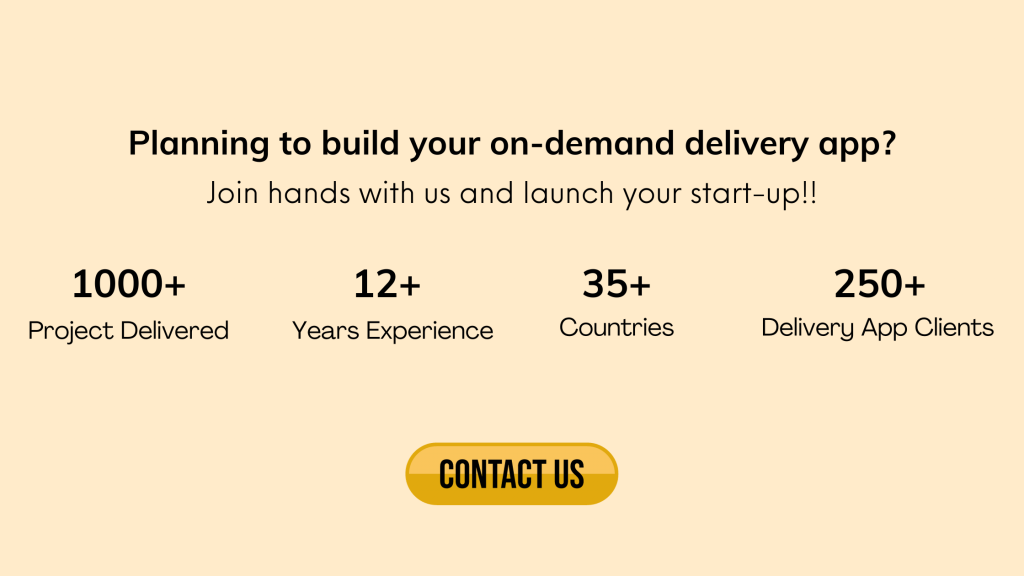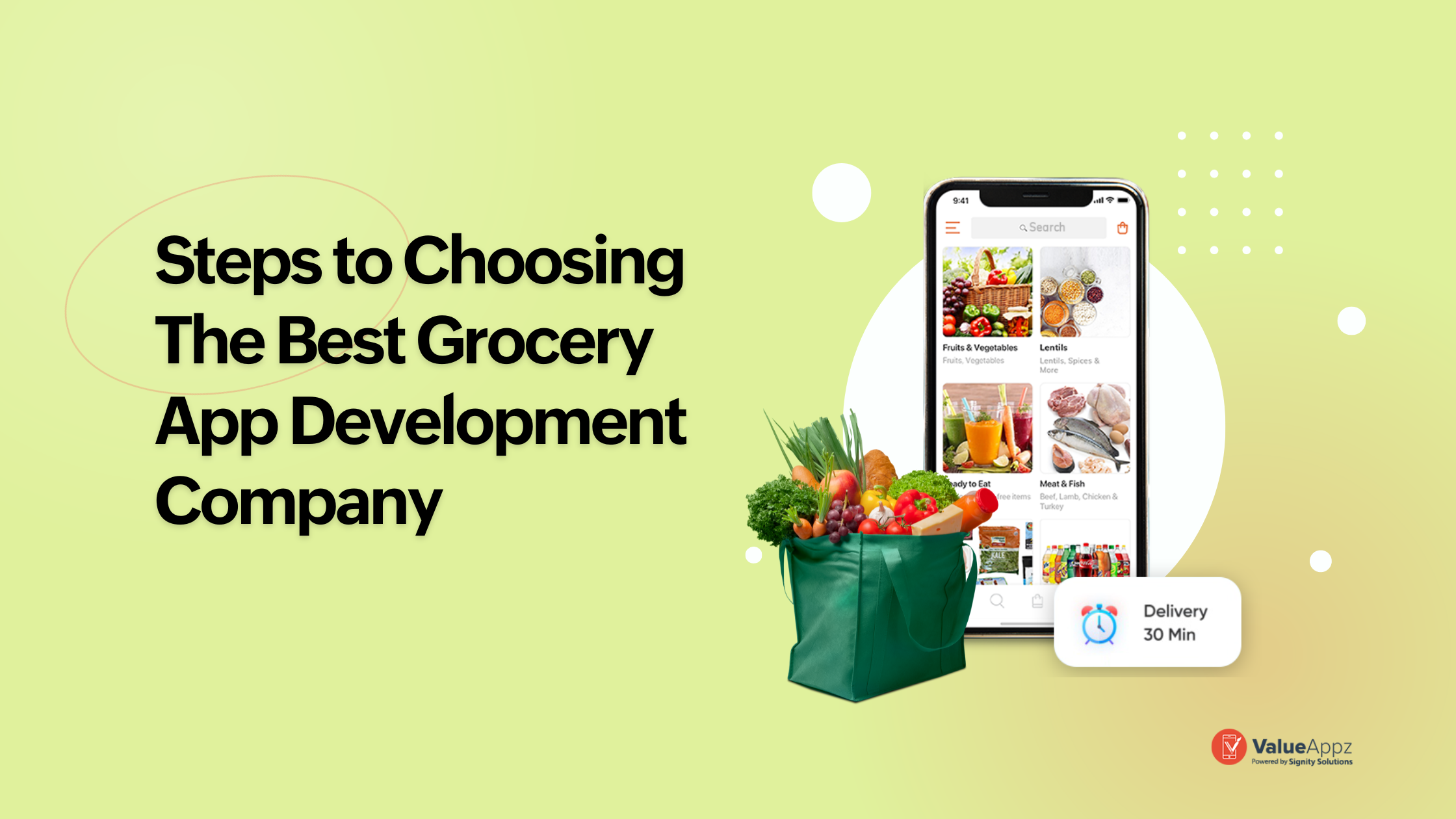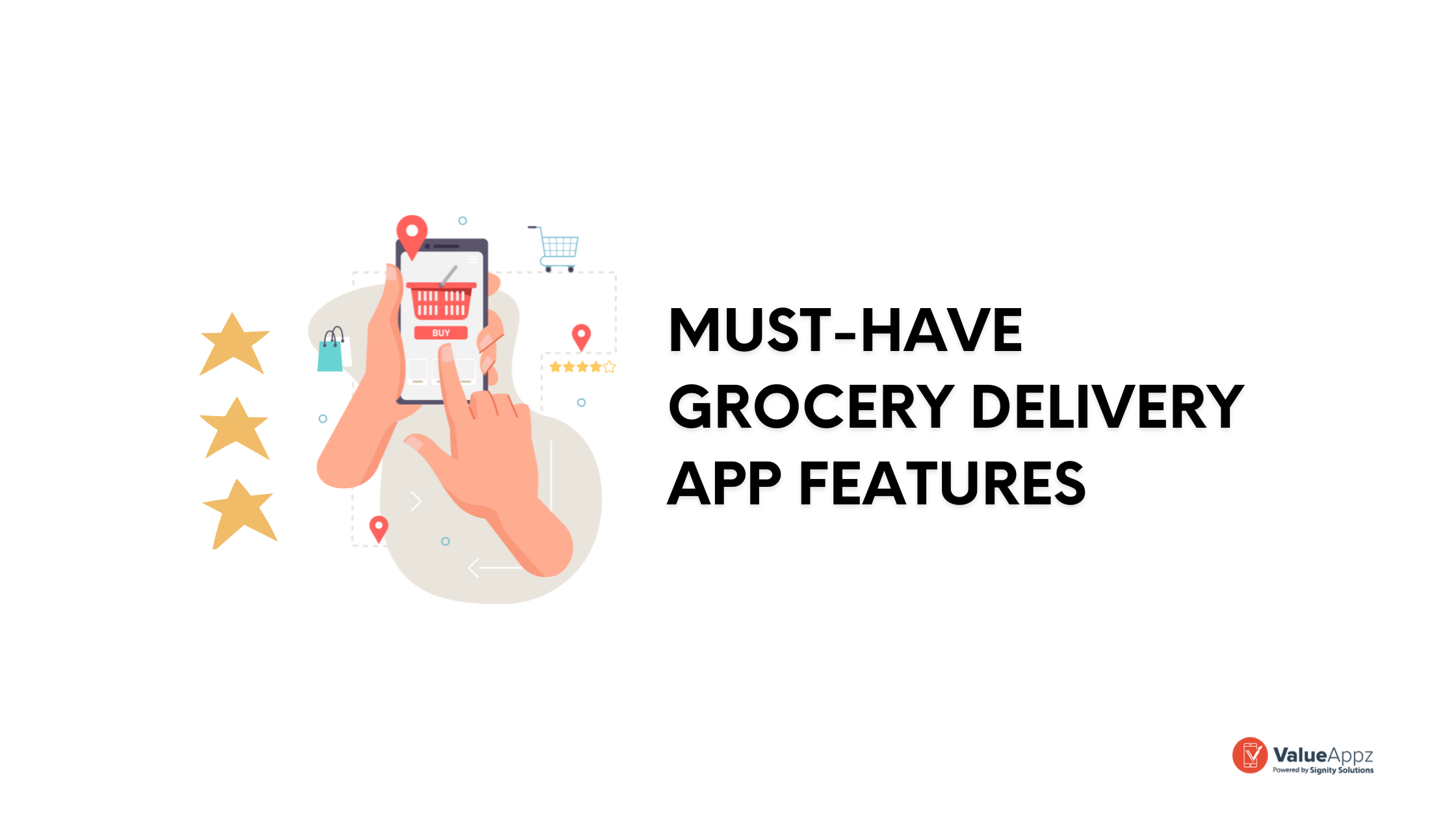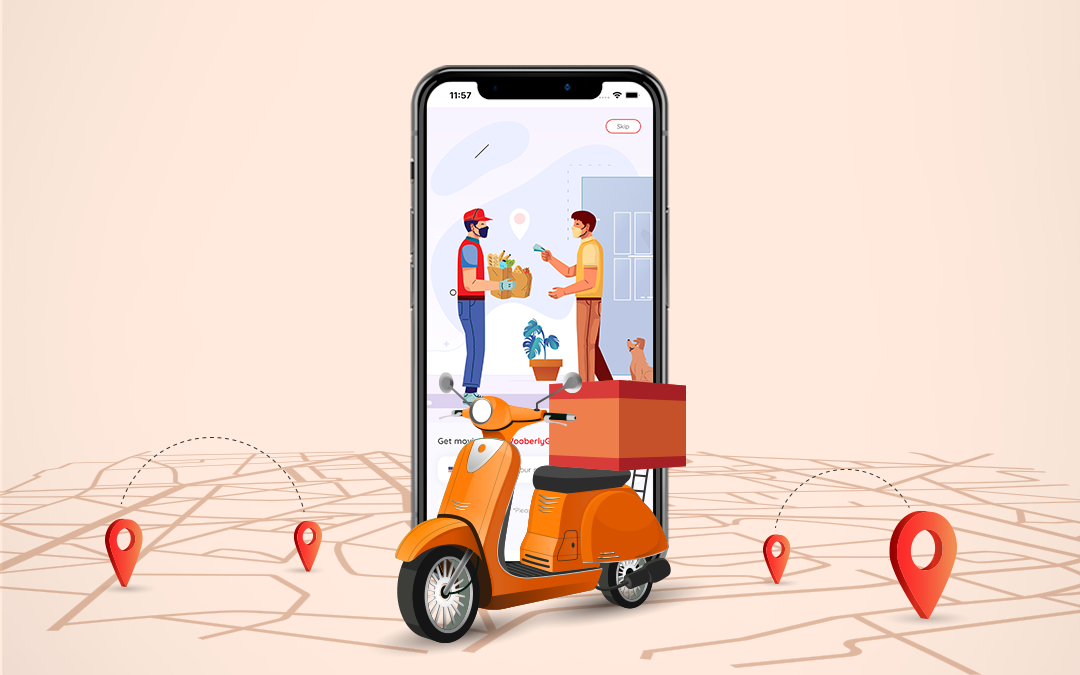Cost of Developing a Grocery Delivery App Like InstaCart
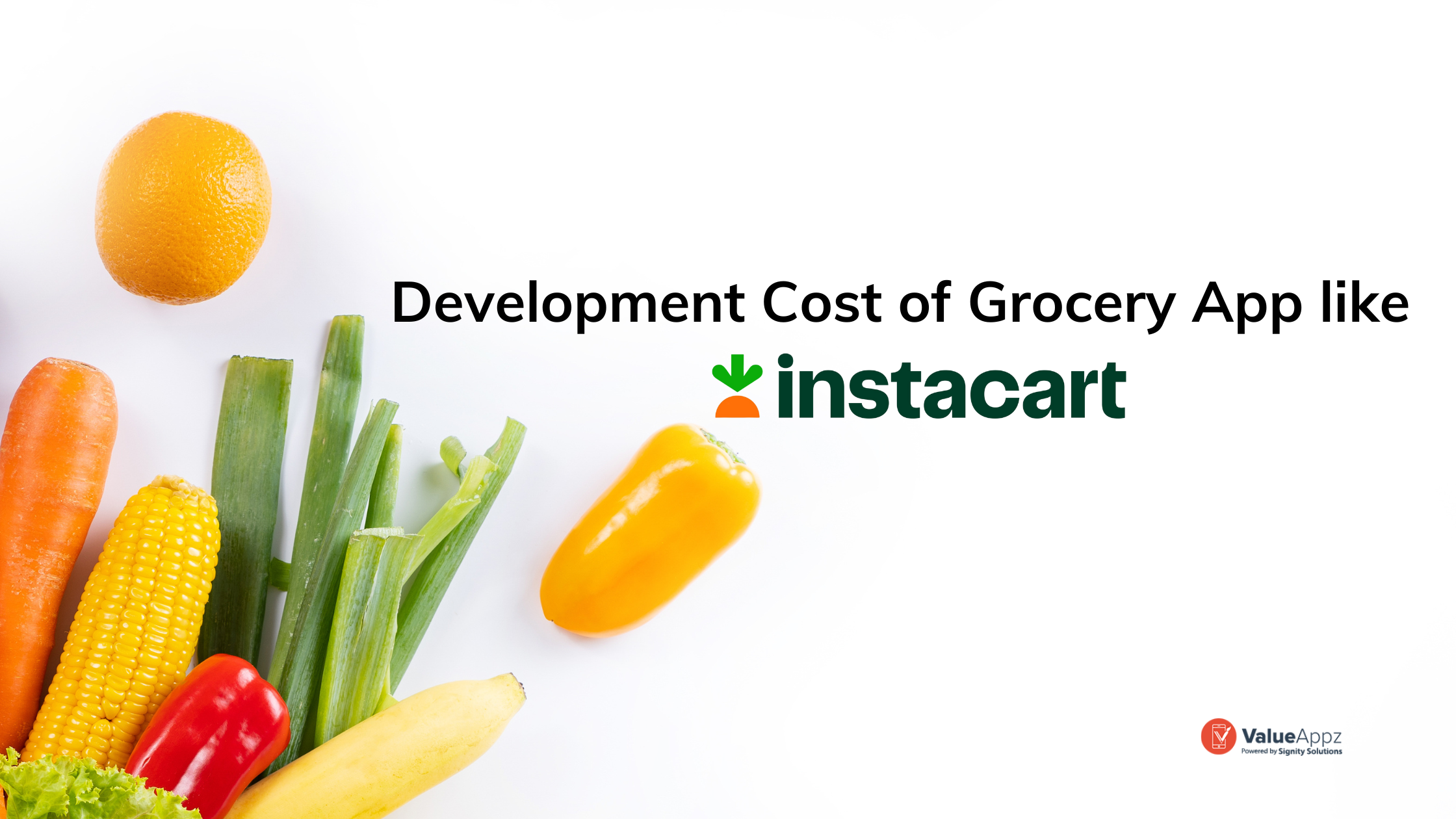
Quick Summary: Instacart is a well-established name in the on-demand grocery delivery industry. Many startups and small businesses are looking to build an app similar to Instacart. But answering the question, “How much does it cost to build a grocery delivery app like Instacart?” is one of the most critical steps. Discover the cost breakdown along with features with our detailed blog.
Would you go to a supermarket, locate the items on your long list, stand in line to pay the bill, or order the groceries through an app and get them delivered to your doorstep? The majority of people will prefer buying it through an on-demand app and saving money through discounts and promo codes.
The market of grocery delivery apps is forecasted to grow to USD 652.45 billion at a CAGR of 19.43% by 2027.
The growing global market provides a golden opportunity for startups and small businesses to invest in an app similar to Instacart and take over the market. Further, the convenience and budget-friendly solutions make the demand for such apps even more higher.
But before you plan to start your own grocery delivery app like Instacart, you need to consider crucial factors like features, design, business model, and app development cost. This blog will help you explore the complete cost of developing an app like Instacart. Before we move on to this part, let’s look at the growth of the Instacart app and its numbers.
Table of Contents
Instacart- a Leading Grocery Delivery App in the Market
Instacart is a popular on-demand grocery delivery platform that allows its users to order groceries and household essentials from local stores and deliver them to their doorstep within hours. The company was launched in 2012 by Apoorva Mehta, a former Amazon engineer, and is based in San Francisco, California.
Instacart operates on a marketplace model, connecting customers with a network of personal shoppers who pick and deliver the items from local stores. The company partners with various grocery retailers, including national chains like Walmart and Kroger, regional chains, and independent stores.
Ever since its launch, Instacart has been able to bring in valuable customers and earn great revenue. The table below proves that.
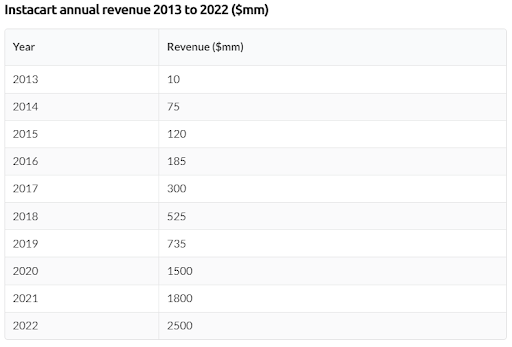
Source: BusinessOfApps
Along with earning massive revenue, Instacart has also engaged users like no other grocery delivery app. Since 2017, the app has seen a growth in its users. The reasons include quick and reliable services, attractive design, and market reputation.
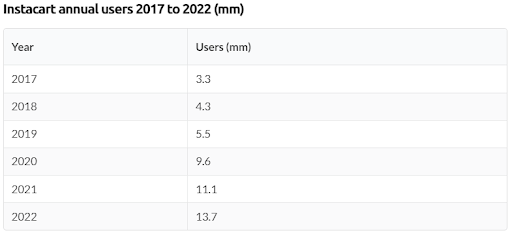
Source: BusinessOfApps
Instacart offers a range of features and services to enhance the grocery delivery experience, such as membership programs like Instacart Express, which offers unlimited free delivery and more benefits for a monthly or annual fee. The company also offers various promotions and discounts throughout the year, such as free delivery for first-time users or discounts on specific items.
Features to Add for Building a Grocery Delivery App Like Instacart
Instacart’s app features are one of the strongest points for its success. With its top-notch features and functionalities, this grocery delivery app ensures that its users get all the needed solutions on one platform. Therefore, to build an app like Instacart, you must add all the necessary features to make it a success. Other than features, you must also know How to Build an App Like Instacart.
Some of the most crucial features include:
1. User registration and profile
Users can easily access services like address and payment method management by creating personalized profiles using social media, email, or telephone, which streamlines future interactions.
2. Product catalog and search
You can make the shopping experience even better through effective search and filtering features and a catalog with images and prices.
3. Quick deliveries
Instacart is known for fast grocery deliveries. In some areas, the brand provides order delivery in as little as 30 minutes. When developing an app like Instacart, you must consider quick grocery deliveries.
4. Shopping cart
A user-friendly cart makes item management simple by allowing customers to add, remove, or change things while monitoring current totals for economical purchasing.
5. Store selection
Users get flexibility because of integration with several local grocery stores. Further, for added convenience, geolocation offers possibilities close by, allowing users to choose their preferred store for shopping.
6. Real-time inventory management
Users receive immediate availability information for products, enabling them to make wise purchases and easily navigate product substitutes when an item is out of stock.
7. Secure payment processing
Instacart app provides several online payment options to its users. The feature allows customers to choose the most trusted and secure payment option, providing flexibility and convenience.
8. Order tracking and notification
One of the most important features of any grocery delivery app is real-time order tracking. This feature ensures that the users get every minute update of their order and receive regular notifications about it.
Adding the above-mentioned features for building an app similar to Instacart will ensure that your brand takes the lead from the competitors, engages the target audience well, and boosts sales and ROI in no time.
Want to know the detailed features to add for the user, service provider, admin, and delivery app?
Check out our guide about How to Build an App Like Instacart.
Development Approach for Creating an App Similar to Instacart
Native app development: This approach is used for building a separate app for each platform (iOS and Android) using platform-specific programming languages (Swift for iOS and Kotlin/Java for Android). Native apps offer better performance, greater flexibility, and access to device-specific features, but they are more expensive and time-consuming to develop.
Hybrid app development: The approach involves building a single grocery app that can run smoothly on multiple platforms using web techs such as HTML, CSS, and JavaScript. Hybrid apps are quicker and more cost-effective to develop than native apps, but they may not offer the same level of performance or user experience.
Web app development: This method involves building a web-based app that users can access through a web browser on any device. Web apps are typically less expensive to develop than native or hybrid apps and can be accessed across all devices with an internet connection.
When choosing a development approach for a grocery delivery app like Instacart, there are several factors to consider, such as the target market, budget, timeline, and desired functionality. Native app development is generally considered the best option for delivering a high-quality user experience. In contrast, web app development is often a more cost-effective choice for startups or businesses on a limited budget. Hybrid app development is a good compromise between the two, offering a balance of cost-effectiveness and functionality.
Time and Cost Required for Building an App Like Instacart
The cost of building an app like Instacart involves plenty of time. From generating unique ideas to planning, designing, etc., each step needs to be examined carefully by specific professionals. That is why the cost of the application can go high.
The cost of the app can vary from $15,000-$60,000. The table below shows the analysis of the estimated time and money needed to create an app like Instacart.
| Development phase | Estimated time | Estimated cost |
|---|---|---|
| Project planning | 2-4 weeks | $5,000 – $8,000 |
| UI/UX designs | 4-6 weeks | $10,000 – $20,000 |
| Front-end development | 8-12 weeks | $20,000 – $30,000 |
| Back-end development | 12-16 weeks | $25,000 – $40,000 |
| Quality assurance testing | 4-6 weeks | $10,000 – $20,000 |
| Deployment and maintenance | Ongoing | $5,000 – $10,000 |
| Total estimated time and cost | 30-44 weeks | $15,000-$60,000 |
Note: The above time and cost estimates are based on the assumption that the app is built by a team of experienced developers, designers, and testers working full-time on the project. The actual time required may vary depending on the project’s scope, the features’ complexity, and other factors.
Below are the reasons why the cost can vary so much when you want to get an app developed:
Development Team: The cost of hiring a development team for building the app, including developers, designers, project managers, and quality assurance testers.
App Design: The price of creating a user interface and user experience design for the app, including wireframing, prototyping, and graphic design.
App Development: The expense of developing the app’s front-end and back-end features, including integration with payment systems, location-based services, and third-party APIs.
Infrastructure: The cost of setting up and maintaining the infrastructure required to run the app, including cloud hosting, server setup, and database management.
Testing: The cost of testing the app for quality assurance, including user testing, functional testing, and performance testing.
Maintenance: The price of maintaining and updating the app after its launch, including bug fixes, security updates, and feature enhancements.
Marketing: The cost of promoting the app through ads, public relations, social media platforms, and other marketing channels.
Legal: The cost of obtaining necessary licenses and permits and legal fees for drafting and reviewing contracts and agreements.
Overall, the cost of building an app like Instacart can vary widely depending on the project’s scope, the complexity level, and the development approach used. It’s essential to carefully consider all of these cost factors when budgeting for a grocery delivery app project.
Additional Cost for Grocery Delivery App Development
The cost mentioned above can further vary based on various factors. For instance, if you want to customize the app features as per the brand guidelines, you will have to invest more money in the development. Below are the reasons and factors that can affect the app development price to an extent.
Customization and integration: If you require additional features or integration with other systems, this may incur additional costs. For example, if you want to integrate with a third-party payment gateway or a loyalty program, this may require extra development work.
Scalability: If you anticipate a large user base, you may need to invest in additional infrastructure to ensure the app can handle the load. It can involve upgrading your hosting plan or investing in load-balancing technology.
Localization: If you plan to launch the app in multiple countries or regions, you may need to invest in localization efforts. It includes translating the app into different languages, adapting the user interface for various cultural preferences, and complying with local regulations.
Security: If you handle sensitive user data, such as payment information or personal details, you must invest in security measures to protect against data breaches or cyber-attacks. It may require hiring a security consultant or investing in security software.
Support: After the app is launched, you will need to provide ongoing support to users. It will require providing customer service through various channels, responding to user feedback, and providing updates and bug fixes.
Overall, these additional costs will depend on the specific requirements and goals of the app development project. It’s important to factor in these potential extra costs when budgeting for a grocery delivery app project like Instacart to ensure that you have a realistic understanding of the total costs involved.
Team and Technology Needed to Create Delivery App Like Instacart
Other than the features and cost, creating a grocery delivery app like Instacart requires a professional team and the leading technology. Both these factors are crucial to guarantee the app’s quality and performance.
Development Team: The development team will be responsible for building the app’s front-end and back-end features, integrating with third-party APIs, testing, and deploying. The team will typically include the following:
- Project Manager
- UI/UX Designer
- Front-end Developer
- Back-end Developer
- Quality Assurance Tester
Technology Stack: The app will require a technology stack that includes:
- Programming languages like JavaScript, Java, or Kotlin for building the app’s front-end and back-end features.
- Front-end development frameworks like React Native, Angular, or Vue.js.
- Back-end development frameworks like Node.js, Ruby on Rails, or PHP.
- Database management systems like MySQL, MongoDB, or PostgreSQL.
- Payment gateway integration like Stripe, PayPal, or Braintree.
- Location-based services like Google Maps or Mapbox.
- Push notification services like Firebase Cloud Messaging or Apple Push Notification Service.
Other Technology Tools:
- Integrated development environment (IDE) like Android Studio or Visual Studio Code.
- Collaboration tools like Trello, Slack, or Asana for project management and team communication.
- Version control systems like Git for tracking changes to the app’s codebase.
- Cloud hosting services like Amazon Web Services (AWS) or Google Cloud Platform (GCP) for hosting the app’s infrastructure.
Overall, building an app like Instacart requires a skilled development team with expertise in front-end and back-end development and experience in integrating with third-party APIs and services. The technology stack will depend on factors such as the app’s complexity, scalability, and budget.
Develop a Robust App Like Instacart with the Top App Development Team
In conclusion, developing a grocery delivery app like InstaCart requires careful consideration of several factors, including market research, development costs, and choosing the right development partner. With the rising demand for online grocery delivery services, investing in a grocery delivery app can be a profitable business venture for entrepreneurs.
To make sure that you get your app developed on the right budget, you need an experienced grocery delivery app development company like ValueAppz. We work with clients to understand their needs and provide cost-effective solutions without compromising quality. Our team also extends help after the application has been developed.
Contact us now, and let’s build a grocery delivery app like Instacart for your brand.
Key Takeaways
- The growing market of grocery delivery apps provides a lucrative opportunity for startups and small businesses to start a grocery delivery app like Instacart.
- Developing an app similar to Instacart involves steps like planning, choosing features, and clearly understanding the development cost.
- The estimated cost to develop an app like Instacart ranges from $15,000 to $60,000. Factors like the number of features, design, and customization can affect the price.
- Creating an on-demand grocery delivery app like Instacart requires a professional development team and a groundbreaking tech stack.
Frequently Asked Questions
Q1. How much does it cost to build an app like Instacart?
On average, the cost to build an app like Instacart can be between $15,000 to $60,000. Further, this cost can be affected by the app’s complexity, design, number of features, and so on.
Q2. How to build an on-demand grocery delivery app like Instacart?
Steps for building an on-demand grocery delivery app like Instacart include:
- Conduct market research
- Choose a business model
- Define the app features
- Design and prototype
- Develop the grocery delivery app
- Test and launch the app
Q3. How profitable is grocery delivery?
Grocery delivery is a profitable industry. Its revenue is expected to grow to US$1,140.00bn by 2027, providing an excellent opportunity for startups and small businesses.
Q4. How does Instacart make money?
Customers pay a delivery or membership fee to obtain unlimited deliveries on Instacart’s platform. They also make money by charging a markup on some goods and collaborating with supermarket retailers
Q5. Is there a monthly fee for Instacart delivery?
Yes, Instacart has a monthly subscription called Instacart Express that enables free delivery on eligible orders that reach a specified amount.
THE AUTHOR
Harjyot kaur
As a technical content writer my focus is on creating high-quality, engaging, and informative content that simplifies complex technical topics. Throughout my career, I have continuously pursued opportunities for growth and development, refining my skills and expanding my knowledge base.

Get ready to digitally transform your business.
Let our team help take your business to the next level. Contact us today to get started on finding the perfect solutions for your business needs.

